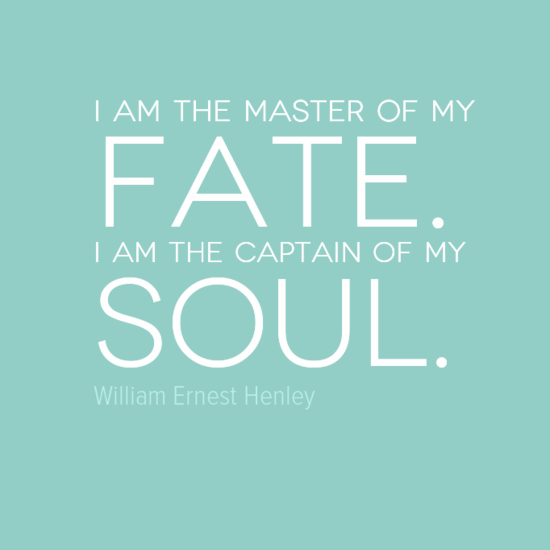

- #I AM THE MASTER OF MY FATE I AM THE CAPTAIN OF MY SOUL PROFESSIONAL#
- #I AM THE MASTER OF MY FATE I AM THE CAPTAIN OF MY SOUL FREE#
Invictus himself was an English poet who lived between 18. This inspirational poetry describes a person's struggle with mental and physical obstacles. Unlike the attitude expressed by the poet, we do not have the last word concerning our fate, nor are we the captain of our souls. ‘I am the captain of my ship and the master of my fate’ by Mira TED Takeaways Medium 500 Apologies, but something went wrong on our end. This renowned phrase, 'I am the lord of my fate, the captain of my soul,' is at the end of one of the finest Victorian-era poems, 'Invictus,' by William Ernest Henley.
#I AM THE MASTER OF MY FATE I AM THE CAPTAIN OF MY SOUL FREE#
He argues that even though we humans have free will and are indeed responsible for the choices we make, God can still overrule us and fulfill His purpose and plans. Paul answered his critics this way: God is sovereign and retains the right to do as He pleases. I am the master of my fate: I am the captain of my soul. His critics questioned whether Jesus could be the promised Messiah since so few Jews accepted Him as such. The Apostle Paul discussed this issue in his letter to the Romans. The Bible makes it clear that while we humans do have freedom of choice, God reserves the right to overrule our choices to carry out His purposes. This renowned phrase, 'I am the lord of my fate, the captain of my soul,' is at the end of one of the finest Victorian-era poems, Invictus, by William Ernest Henley. Others quote it to express their belief that God does not exist to whom we must give account. I am the captain of my soul.” Some quote the poem to express persistence during trials. The last stanza goes like this: “It matters not how strait the gate, How charged with punishments the scroll, I am the master of my fate. William Henley wrote the poem “Invictus” in 1875. We become this by taking complete responsibility for how we react to each situation in which we find. Beyond this place of wrath and tears Looms but the Horror of the shade, And yet the menace of the years Finds and shall find me unafraid. As William Henley points out, I am the master of my fate: I am the captain of my soul. Under the bludgeonings of chance My head is bloody, but unbowed. It matters not how strait the gate, How charged with punishments the scroll, I am the master of my fate: I am the captain of my soul. William Ernest Henley (1849-1903), an English Poet, had one of his legs amputated at the age of 17. This famous inspirational poem charges us to accept responsibility for our lives no matter our circumstances. To confront adversity and to come out the other side of it with the creation of positive change.Subscribe: RSS Don’t see the audio player? Click here. In the fell clutch of circumstance I have not winced nor cried aloud. Looms but the Horror of the shade, And yet the menace of the years. We are responsible for our own happiness. Invictus by English poet William Ernest HenleyĪs we maneuver through these challenging times, let us keep in mind the power of this poem… Invictus, meaning unconquerable or undefeated in Latin, was written in 1875 by William Ernest Henley.
#I AM THE MASTER OF MY FATE I AM THE CAPTAIN OF MY SOUL PROFESSIONAL#
Self assurance is one of the most powerful qualities you can use to fuel your personal growth, particularly in a professional setting. Nelson Mandela, the anti-apartheid leader who was jailed 27 years for his activism and in 1994 became President of South Africa, regularly recited the poem Invictus during his imprisonment. I am the master of my fate: I am the captain of my soul. For centuries, leaders throughout the world have turned to poetry for solace and for a call to action. In today’s tumultuous world poetry has a valuable place, a place for recording sentiments and feelings, events and reactions.


 0 kommentar(er)
0 kommentar(er)
